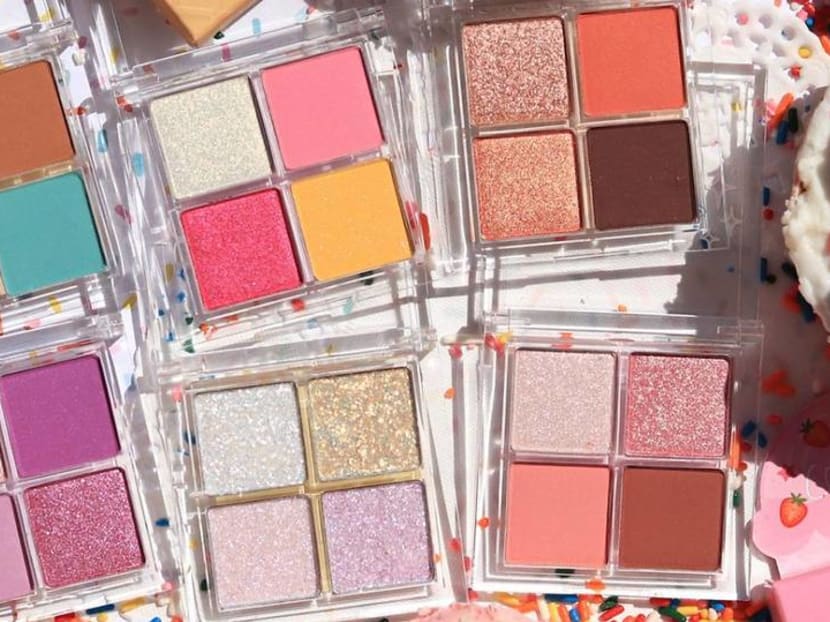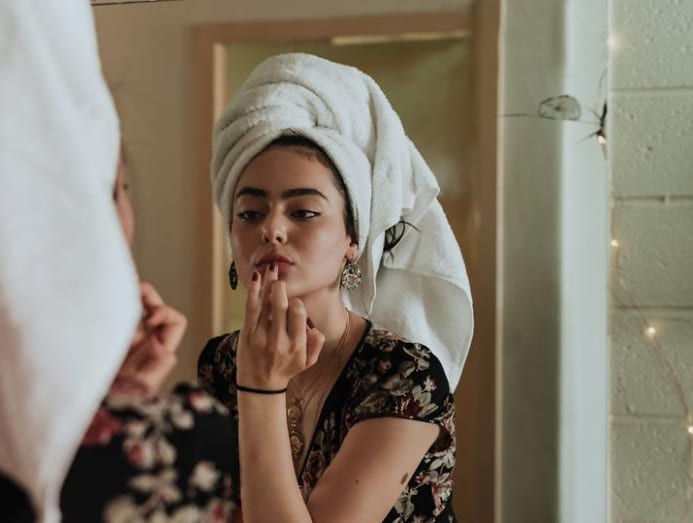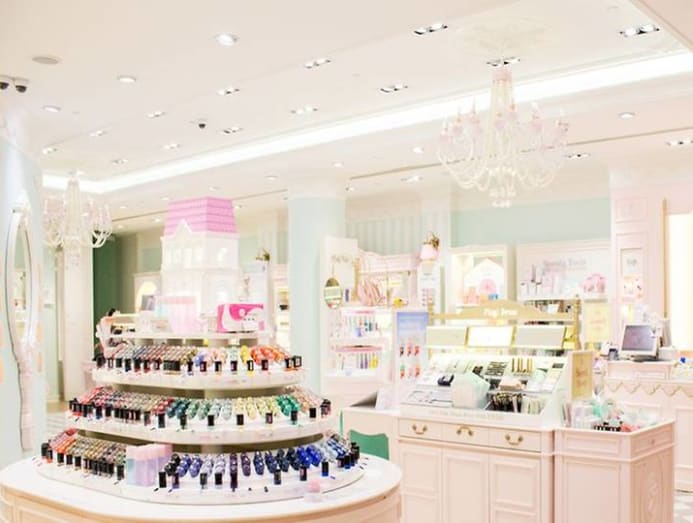Commentary: Are cheap cosmetics from online brands legit?
With such low prices, one might wonder if fast beauty products are inferior, or worse, harmful, says beauty expert Kristen Juliet Soh.

A collection of ColourPop eyeshadows. (Photo: Facebook/ColourPop)
SINGAPORE: You’re probably familiar with fast fashion. Retailers such as Zara, H&M and Topshop fall into that category by churning out trendy apparel at breakneck speeds and affordable prices.
Chinese online fashion company Shein has been attracting media attention for its aggressive expansion, outpacing conventional fast fashion brands.
Fashion isn’t the only thing Shein delivers quickly and cheaply. It also owns Sheglam, a beauty brand offering products at lower-than-usual prices. We’re talking about nine-colour eyeshadow palettes as cheap as S$8.
Sheglam is one of the players in the growing market of fast beauty. Just like fast fashion retailers, these beauty brands roll out cosmetics cheaply and quickly.
How quick? While traditional beauty brands typically launch new collections four times a year, these brands release a new line of products at least once a month, sometimes even a few times a month.
One highly popular brand is ColourPop, established in the US in 2014. The brand has a reputation among millennials and Gen Z for high-quality yet affordable products. For instance, a ColourPop lipstick costs only US$7 (less than S$10) and receives rave reviews for its creamy formulation and rich pigmentation.
The trendy brand has more than 10 million followers on Instagram and has a new launch every month.
The rise of such fast beauty brands is a response to the growing demands of beauty consumers who are savvier, fickler and very trend-conscious. This has been further fuelled by the growth of e-commerce, which makes purchasing makeup a lot easier and faster.
Fast beauty brands appeal to consumers who want to buy, try, and move on to the next new thing – quickly.
And those numbers are getting bigger. A Telegram poll within the beauty community of Daily Vanity found most people are willing to buy cheap makeup online and, in fact, have been doing so.

But two questions linger on everyone’s mind: How are these brands able to sell their products so cheaply? And are they really safe to use?
HOW PRICES ARE SO LOW
There are several things conventional beauty brands invest in that drive up their costs. First, it’s R&D to create better formulas that are effective and enjoyable to use.
In order to develop new products, beauty brands need deep pockets to research and test active ingredients and their effects on skin, and to create better formulas that are effective and enjoyable.
Fast beauty brands sidestep these costs by using tried-and-tested formulas that aren’t patented and replicating them in their own products.
American skincare brand The Ordinary has gained a cult following, as dermatologists and skincare experts endorse the brand while consumers gawk at the too-good-to-be-true price tags.
The reason why The Ordinary can keep costs low is because they use technologies that are well-studied. Some of their product ingredients include vitamin C and alpha-hydroxy acid, which have both been proven to work: The former lightens skin pigmentation and the latter prevents blackheads and pimples.
Besides not needing to plough money into researching new ingredients for their products, The Ordinary doesn’t have to spend on marketing because consumers are already familiar with the ingredients’ efficacy.
The Ordinary also uses minimalist packaging, which is not only cheaper, but also aesthetically appealing to fans.
Cheap beauty products are usually characterised by two other things: They’re sold online, saving them the cost of running brick-and-mortar stores and throwing money into top-of-the-line marketing.
They tend to lean heavily on key opinion leaders to get the word out for “free”. They typically use two strategies: Partnerships with other popular brands and eye-catching packaging.

ColourPop, for instance, regularly does several high-profile collaborations with pop culture icons, including animated television series Powerpuff Girls and video game series Animal Crossing – figures their key target audience of Gen Z and millennials are familiar with.
Besides sending products to influencers ahead of launches, ColourPop’s “Instagram-worthy” products are so affordable, American content creators who didn’t receive the items will nonetheless get their hands on them to populate their makeup tutorials.
These micro-influencers, with followers anywhere from the 10,000s to 100,000s range, feature ColourPop on their YouTube and Instagram channels simply because the products look good on their feed, giving ColourPop exposure it doesn’t have to pay for.
TOO GOOD TO BE TRUE?
With such low prices, one might wonder if fast beauty products are inferior, or worse, harmful. How can we tell if these cosmetics are legit?
Before clicking on the “Check Out” button for that S$4 lipstick, do a little research into the brand. Is the brand backed by a larger corporation?
For instance, K-beauty brand Etude is part of Amorepacific Corporation, a beauty conglomerate that also owns renowned skincare brands like Laneige and Sulwhasoo.
Etude keeps costs low thanks to the economies of scale afforded by a large corporation.
Its products are also likely to meet a certain standard since it can tap on the research and manufacturing strengths of its sister brands.
For instance, Etude leveraged the sleeping mask and cushion foundation trend pioneered by Laniege and IOPE respectively, offering them at wallet-friendly prices.
The caveat is that brands not backed by huge companies can also offer good quality, because many standard formulas for makeup aren’t patented and chemists can easily recreate what’s well-liked by customers.
I’d say the litmus test to consider is whether the brand is dedicated to building a “brand” or if its sole unique selling point is its low price.

A cosmetics company in the long game will have a consistent marketing message regardless of the products they launch. Etude, for example, has projected a message of “playing” with makeup and creating girlish looks, reinforcing that youthful reputation through community engagement on social media.
On the other hand, a product that looks like a knock-off of a popular counterpart may be out to make a one-time killing with its dirt cheap price. That’s the one we should be wary of, because its lower price likely came about from cutting corners.
TO BUY OR NOT TO BUY?
The good thing is that beauty consumers have a wealth of resources online that allow them to research brands and product reviews.
For make-up rookies still trying to figure out the styles and products they like, cheap makeup is a fuss-free way for them to experiment with different looks and practise makeup techniques.
Beauty junkies, on the other hand, cannot resist a product with beautiful packaging, especially if it doesn’t break the bank.
Sure, they may sometimes find that the product quality doesn’t meet their expectations and end up throwing it away, wasting time and money.
But trying out new products always ends in a hit or a miss, and “misses” are just part of the experience beauty enthusiasts enjoy. They’ll gleefully inform the beauty community when something is an epic fail or will boast about landing a cheap hidden gem.
While the pandemic has relegated us our homes, buying and trying new products is the cornerstone of a beauty junkie’s lifestyle – even if that flattering lip colour is covered by a face mask. Affordable and trendy beauty products definitely have their place.
In the Daily Vanity Beauty Consumer Report 2020, Etude was voted among the top 10 most trusted makeup brands by beauty consumers in Singapore – showing that cheap does not mean a brand has poor quality and should be distrusted.
Kristen Juliet Soh is the editorial director and co-founder of Daily Vanity. Kristen and Daily Vanity do not have commercial dealings with the brands mentioned here.








